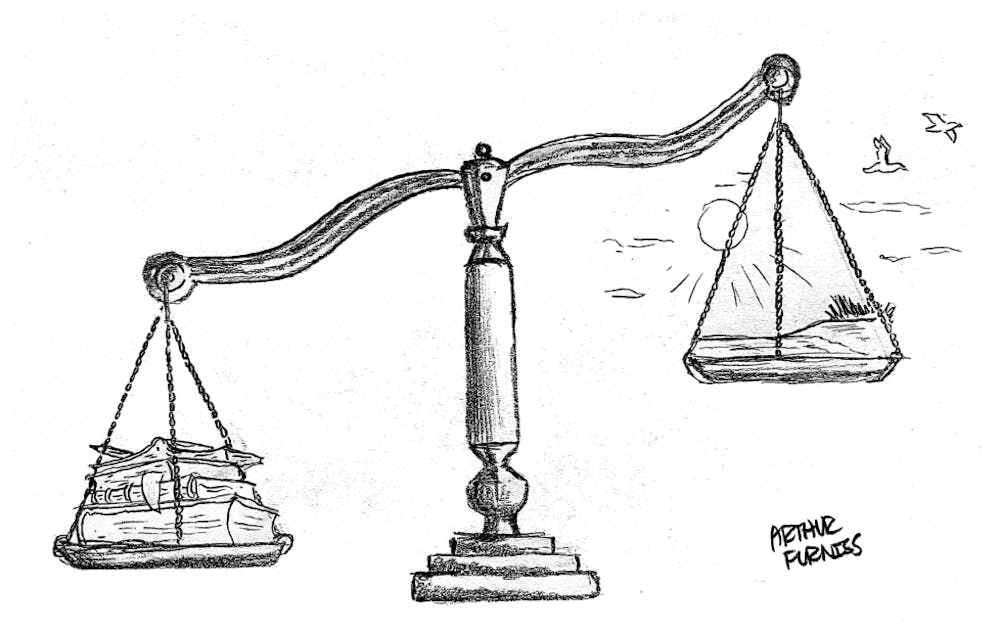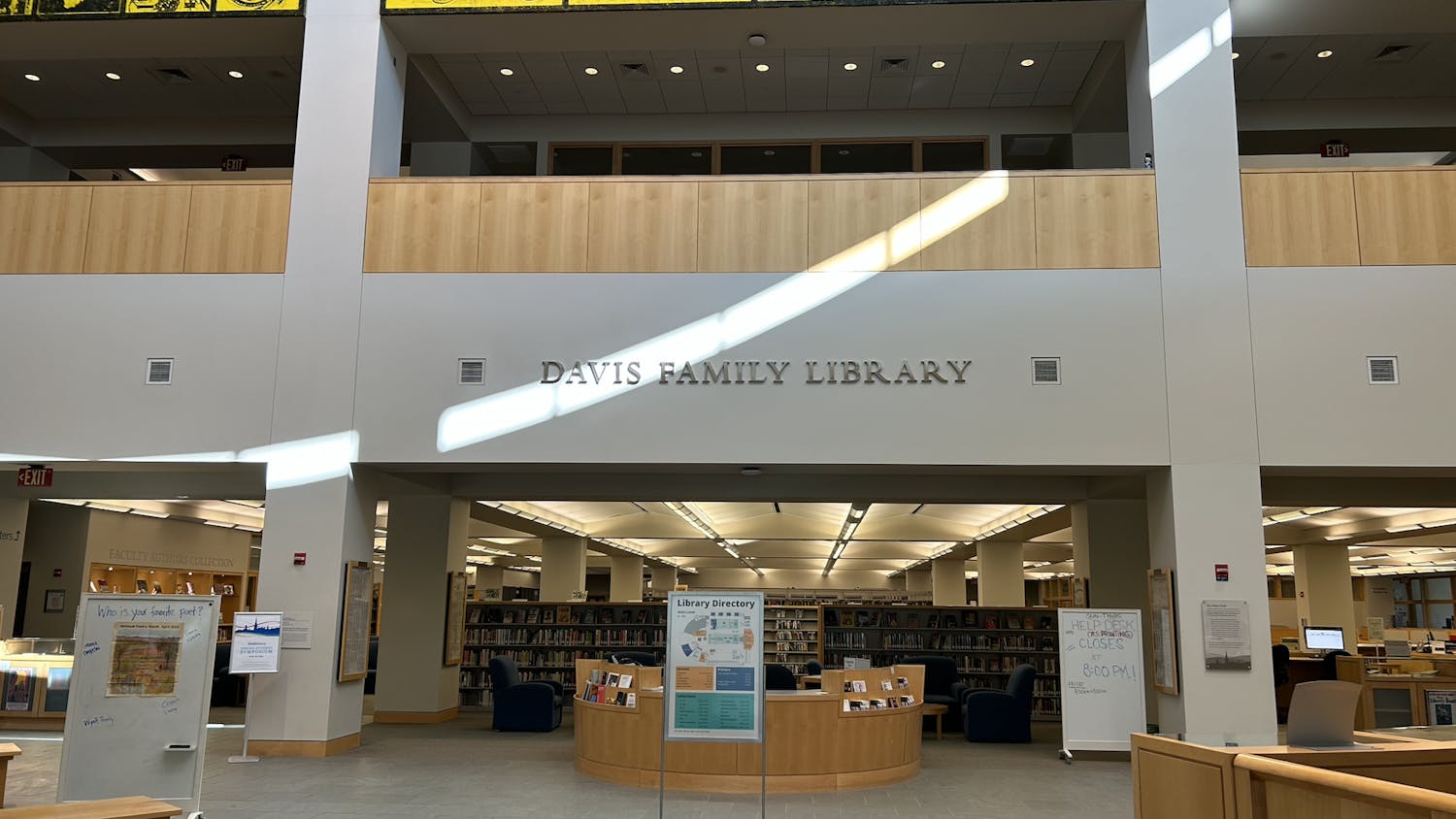Last week, the Middlebury Campus Editorial Board used their platform to call upon the administration and professors to address what they perceive to be a pressing campus issue: insufficient free time. We don’t disagree with the general thrust of their argument. Access to nature is an essential aspect of Middlebury. Our natural setting attracts many students to apply in the first place, and nature has been proven to improve mental health. We take issue with how the Editorial Board infantilized the student body in the service of their argument and failed to recognize the priorities of many students they aim to help.
Though the editorial recognizes Middlebury as “first and foremost an academic institution,” many of the Board’s proposals seem to promote an ethos of leisure at the expense of intellectualism. As students without vehicle access, we support the call for better public transportation to the outdoors. However, our grievance lies with the Board’s suggestion that professors ease up on the work in order to “spring us from our academic cage.”
The Editorial Board’s plea that the school help us escape our “academic cage” fails to recognize Middlebury’s mission: the “academic cage” offers more freedom than restraint. Many people have worked their entire lives to come to a prestigious institution like Middlebury and will reap its benefits for generations to come. By characterizing Middlebury’s workload as “a cage,” the Editorial Board casts learning as oppressive, when it is in fact the very reason we are here. After all, there are far less expensive ways to have fun. We suggest Mykonos.
Decreasing academic standards by encouraging professors to assign less work has the potential to negatively harm our school's intellectual reputation and decrease the benefits of our diplomas. We understand that the Editorial Board does not speak for everyone, but we want to emphasize that decreasing our school's academic standards is contrary to students’ long-term benefit.
The Board advises students to learn to prioritize what matters to them. We agree that learning to balance work and play is one of the most critical skills college teaches us, but this skill set should be entirely self-directed and not at the expense of academic priorities. We can’t learn to prioritize if we never find out, through trial and error, what is truly worth our time. Spending an afternoon at the lake instead of working on a paper may result in a worse grade. It is up to us to decide if taking the trip is worth the B.
However, rather than harping on disagreement, we wish to use the Board's editorial to make our own argument about how best to shape Middlebury culture. Among some students, the idea that any fun will come at the expense of their GPA seems to be an intolerable cost. We believe deciding whether to take that cost is an essential part of our education. The problem arises when students expect an A while neglecting their academic responsibilities. That attitude, implicit in the notion that our standards should decrease when it's sunny, makes our community seem lazy and entitled.
Student entitlement is inextricable from the rampant grade inflation at Middlebury. We would like to advocate for more meaningful grading and a return to cultural curiosity. Though common in recent years, grade inflation runs contrary to Middlebury’s identity. Before we entered college, we were told by teachers that college was different from high school: an A was the mark of exceptional work. In our experience, Middlebury students expect A’s for average work; anything else is an exception. While that might be a comfortable rule in the short-term, it is a shame. We chose Middlebury because we craved an intellectual challenge as much as we craved the Green Mountain skyline. We wanted our minds to be stretched and our ideas challenged, even if we had fewer days outside or our GPAs fell a few tenths.
We do not wish to attack the Editorial Board’s emphasis on mental health. Keeping people safe is the top priority. However, we believe self-improvement lies at the root of wellness. Intellectual growth promotes long-term wellness by spurring self-growth and fulfillment. Wellness is not an excuse to avoid hardship but a challenge to skillfully and safely navigate it in pursuit of long-term benefits. Truly emphasizing wellness does not mean eliminating challenges, but creating people who can face them. Healthy people understand how to deal with inevitable disasters because they have had experience solving them in a supportive environment. Taking away our opportunity to face emotional and academic challenges fails to nurture our growth and prepare us for post-grad life.
If your top priority is not school, that is your prerogative. Often, the blind pursuit of an A is contrary to learning. Prioritizing learning means incorporating wellness and understanding that our actions, like going on a hike instead of doing a reading, should be reflected in our final grades. There is a particular entitlement in treating Middlebury like a summer camp, subordinating learning and growth to “fun” and “relaxation.” You are not entitled to an A. Professors should only give top marks to students who produce outstanding work. Everyone who prioritizes other growth forms should accept the costs of such pursuits and be proud of their work. An A- or a B+ is not the end of the world.
Additionally, we may have to consider the possibility that professors and career administrators better understand our interests than we think. We reserve the right to protest for more free time. However, Middlebury’s primary duty is not to accommodate our short-term comfort but to help us reach long-term goals. It may be more productive to advocate for what we want Middlebury to help us become than to complain about how they go about it. We sought out this institution because we trusted it to educate us and help us fulfill our dreams. That should not change because it's sundress season. A stressful weekend in Davis is much less detrimental to “long-term health” than realizing you have failed to reap the benefits of your expensive education. After all, the freedom of wide-ranging intellectual exploration is unique to undergrad. At no other point in our lives will we be able to exist in a community whose primary purpose is to nurture our curiosity and quests for self-actualization.
Though it might not always feel like it, our time at Middlebury is decidedly finite. In four blinks of an eye, undergrad passes and we’re kicked out of the nest into the “real world” where, excepting grad school, our previous academic preoccupations are obsolete. For some students, this might come as a relief. For many, it will fall as a blow. In this piece, we have urged students to strive for a higher degree of intellectual fervor. The liberal arts require us to be actively curious to maximize utility. As Middlebury students, we are all bound by the fact that we sought a specialized model of education which aims to immerse us in “the life of the mind and soul” and prepare us to change the world. We can scrutinize the success of that promise, but we, obscure moralists, would like to believe in the ambition of its mission. Our Middlebury education begs to be put to good use. We can not return the privilege afforded to us if we don’t take advantage of our intellectual opportunities while we’re still able.

Sarah Miller '24 (she/her) is an Editor at Large.
She previously served as Opinions Editor and Staff Writer. Miller is an English major on the Creative Writing track. She hails from Philadelphia and spent the spring studying English at Trinity College Dublin. She has interned for The New England Review and hosts a WRMC radio show where you can still listen to her many opinions.



